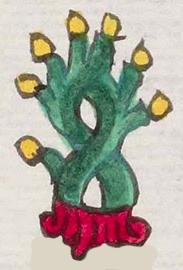malinalli (Mdz16r)
This element for malinalli (twisted grass) has been carved from the compound sign for the place name, Malinaltepec. The twisted grass is painted two shades of green and forms a figure eight, with seven yellow blooms coming largely off the top half of the figure eight and red roots at the bottom. The yellow blooms are small, solid yellow circles sprouting off the main trunk.
Stephanie Wood
This version is different from the malinalli day sign with the skull (see below), which has a calendrical association. This one probably emphasizes the edible grass or the dry grass/hay that could be twisted and used for tying or bundling things or building, or for medicinal uses, as explained elsewhere. In his Spanish to Nahuatl section, Alonso de Molina translates malinalli as paja (Spanish for hay). Malinalli is also a day sign in the tonalpohualli religious divinatory calendar.
Stephanie Wood
c. 1541, but by 1553 at the latest
Stephanie Wood
grasses, medicinal herbs, hierbas medicinales, hay, paja

malinal(li), grass, twisted grass, twisted, https://nahuatl.wired-humanities.org/content/malinalli
la paja, la hierba
Stephanie Wood
Codex Mendoza, folio 16 recto, https://digital.bodleian.ox.ac.uk/objects/2fea788e-2aa2-4f08-b6d9-648c00..., image 42 of 188.
The Bodleian Libraries, University of Oxford, hold the original manuscript, the MS. Arch. Selden. A. 1. This image is published here under the UK Creative Commons, “Attribution-NonCommercial-ShareAlike 3.0 License” (CC-BY-NC-SA 3.0).




